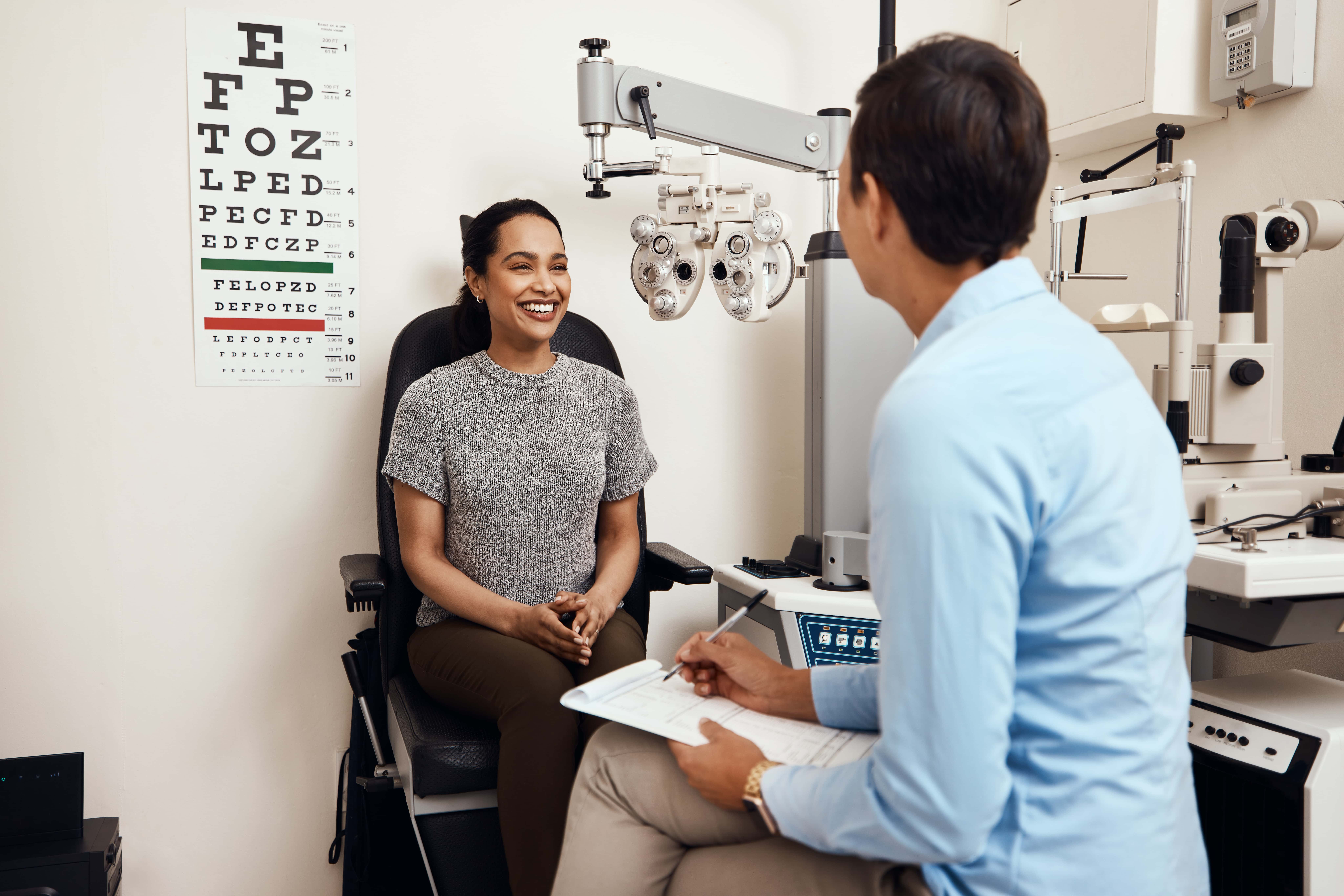Updated on January 30, 2025
The Best Vision Insurance of 2025


Vision Center is funded by our readers. We may earn commissions if you purchase something via one of our links.
What are the Best Vision Insurance Companies?
Vision plans vary, so it’s difficult to determine an overall best plan. What works for one person might not be the best option for another. However, some plans stand out for certain reasons.
VSP
VSP is regarded by many as the best overall vision insurance plan. It offers a wide range of coverage options, including discounts on glasses and contacts. VSP also has a large network of providers, making it easy to find an optometrist or ophthalmologist in your area.
United Healthcare (Spectera)
UnitedHealthcare (Spectera) is good for those considering LASIK surgery. Most insurance companies don't cover LASIK, but Spectera offers discounts on the procedure. It also has a large network of providers and offers discounts on eye care and eyewear.
Humana
Humana (EyeMed) is popular among those who wear contact lenses. The company offers generous coverage regarding contact lens fittings, replacements, and exams. Humana has over 95,000 locations in its network, allowing you to find an eye doctor near you easily.
Davis Vision
Davis Vision offers the most comprehensive coverage. This company is a great option if you want to get the most out of your vision insurance. They consider your overall health when determining coverage and offer discounts on a wide range of eye care services.
MESVision
MESVision is another fairly common vision plan. Their broad coverage includes discounts on glasses, contacts, and exams. They also have a large network of providers, with over 32,000 ophthalmologists, opticians, optometrists, and retail outlets across the country.
Determining which plan is best for you and your family requires understanding what you need and what each plan offers.
Best Vision Plans for Families
If you are looking for a plan for a family with children, you have a few options. Most vision plans for kids and families cover eye exams and preventative care, eyeglasses and frames, contact lenses, and some enhancements, such as scratch-resistant treatment.
Some of the best vision plans for families include:
- VSP for overall care
- Davis Vision for affordability
- Humana for contact lens wearers
- UnitedHealthcare for low deductibles
Vision care will not be free with these plans, but they will save you out-of-pocket expenses. You’ll pay less if your children or other family members need glasses or contact lenses.
The average cost of a vision plan is very reasonable and ranges from $15 to $20 per month, depending on the plan. If you want a plan that offers greater coverage for eyewear or a larger network, so you have your choice of more eye doctors, you’ll likely pay closer to $40 per month.
Best Vision Plans for Individuals
Like family vision plans, choosing the best plan for individuals requires understanding your needs. In many cases, the best plan for you is the same as for a family.
Adults are more likely to wear contact lenses than younger children. They can undergo LASIK surgery, so plans like UnitedHealthcare and Humana that cover these items tend to be more popular with adults.
In addition to LASIK coverage, UnitedHealthcare also offers:
- Coverage of eye exams, contact lenses, and glasses and frame allowance
- Paperwork-free process
- Scratch-resistant coating on every pair of glasses purchased through a network provider
- Optional contact lens benefit
- Large national network
In addition to generous contact lens coverage, Humana offers:
- Annual vision exam
- Yearly allowance toward contact lenses or glasses
- Options for progressive lenses, anti-scratch coating, tint, etc.
- Once-a-year or once-every-other-year frame allowance, including designer or brand name options
- Discounts on LASIK and PRK procedures
Types of Vision Plans and Coverage
There are generally two types of vision plans.
- The first is a vision benefits package, much like regular health insurance
- The other is a vision discount plan
Plans vary, but in most cases, they provide basic coverage that includes benefits like a routine eye examination and glasses or contact lenses.
What Do Vision Plans Cover?

For the most part, a vision plan covers annual eye exams and a single corrective piece of eyewear. These might be basic frames and prescription lenses, and/or contact lenses. Some cover eye health procedures or corrective services, but this is not always the case.
Benefits of Vision Plans
Benefits vary from plan to plan. In general, the biggest benefit of having vision coverage is the reduction in the cost of eye exams and vision products.
You’ll pay less for eye health care if you have a vision plan. Some plans also offer cost savings for eyeglasses or contact lenses and vision correction services, including LASIK costs. The savings vary, but some plans can save you hundreds or thousands of dollars a year.
Alternatives to Vision Insurance
If traditional vision plans aren’t right for you, there are a few other options. For example:
Vision Discount Plans
Vision discount plans or savings plans provide a discount on vision services without locking you into a plan.
As a member of a discount plan, you receive a card that you show to your preferred vision healthcare provider that gives you discounts on basic vision care and some elective procedures.
You pay less upfront and more at the time of service, but you are not responsible for the entire service cost. Some vision plans allow you to see an out-of-network doctor.
The benefit of a vision discount plan is flexibility and affordability. These plans are great for people who want to keep up with routine and preventative eye care but don’t want to spend much on vision coverage and don’t have eye health concerns.
FSA and HSA
Flexible spending accounts (FSAs) and health savings accounts (HSAs) let you set aside money for health-related expenses.
You contribute to these funds directly out of your paycheck before federal taxes and some state taxes are deducted. This results in savings of about 30 percent.
You’re able to use the money in an FSA or HSA to pay for vision services and products that include:
- Routine eye exam co-pays
- Prescription glasses
- Contact lenses
- Contact lens solution
- LASIK and other refractive surgeries
- And more...
Speak to your employer if you believe an FSA or HSA might be right for you.
Summary
Choosing the best vision plan for individuals requires understanding your needs. Popular plans offer coverage of eye exams, contact lenses, glasses, and other eye care procedures.
If you think that traditional vision plans aren’t right for you, there are alternatives, such as vision discount plans and FSAs/HSAs.
In this article
6 sources cited
Updated on January 30, 2025
Updated on January 30, 2025
About Our Contributors
Mara Sugue, with a B.A. in Social Sciences, is a dedicated web content writer for Vision Center. She is committed to making eye health research accessible and understandable to people from diverse backgrounds and educational levels. Her writing aims to bridge the gap between complex vision health topics and readers' needs for clear, factual information.
Dr. Melody Huang is an optometrist and freelance health writer with a passion for educating people about eye health. With her unique blend of clinical expertise and writing skills, Dr. Huang seeks to guide individuals towards healthier and happier lives. Her interests extend to Eastern medicine and integrative healthcare approaches. Outside of work, she enjoys exploring new skincare products, experimenting with food recipes, and spending time with her adopted cats.

